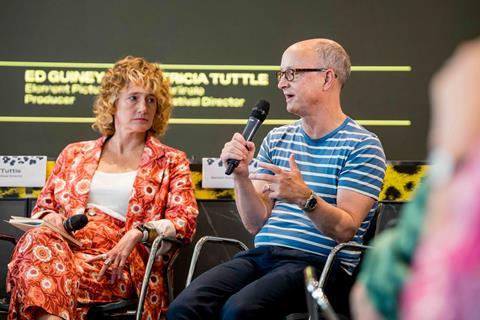
Major streamers are “throttling” the independent film ecosystem by “significantly underpaying” for pay 1 and pay 2 licence fees because of their commercial bargaining power, according to AGC Studios chairman and CEO Stuart Ford.
Ford, speaking on a panel titled ‘Embracing Risk’ at the Locarno Film Festival, also urged film distributors in Europe to “rediscover their capacity for risk” and suggested that the US distribution community is set to embrace pre-buying once again.
He was speaking alongside Berlinale festival director Tricia Tuttle and Element Pictures co-founder Ed Guiney at Locarno Pro’s StepIn think tank for distributors, exhibitors, producers, sales agents, institutions, festivals and streamers.
Ford lauded the streamers for being “tremendously active in investing in film and television” but said there is one area where they have let the industry down – what they are prepared to fork out for pay 1 or pay 2 licence fees after a film’s theatrical release.

“All of the industry streamers, because of their commercial bargaining power, have been for several years significantly underpaying for those rights and essentially throttling the whole ecosystem. It needs to change. I think it will, because their model is changing.”
Citing the investment that goes into making and marketing theatrical films to create global awareness, Ford said that streamers “mustn’t kill the goose that lays the golden egg by throttling the distribution community.”
Ford also predicted that the US distribution sector is “shifting into a new phase” and that “pre-buying films is going to regain its footing as a feature of the business model” of many companies.
“If they do that, there is a knock-on effect throughout the whole industry,” he said, one that encourages investors, foreign distributors and talent.
Support for distribution and exhibition

Meanwhile, the Berlinale’s Tricia Tuttle highlighted the fact that 95% of films programmed at festivals will struggle to secure cinema distribution that allows them to reach an audience.
She suggested that European public investment, much of which is geared towards production, also be used “intelligently” to support distribution and exhibition. “There is no point making the films if people can’t see them or find them.”
Tuttle cited the UK as having “got it right in terms of public investment in production, but not so much on the exhibition side….and that is pretty true of everywhere except for maybe France. It is critical that we solve the exhibition problem.”
Highlighting the challenge, Tuttle said that some festivals watch 8,000 films for their selection. “You are always looking for people to surprise you, you are always looking for new and fresh ideas… so risk-taking isn’t so much of a problem at the festivals. What is a problem, and has been increasingly since the ’80s and ’90s, is this disconnect between the very commercial side of the industry, and the side of the industry that I work in – festivals. It’s like there is a chasm now, which has been getting broader and wider every year. [Bridging that chasm] is the Holy Grail.”
Private financing
Guiney, meanwhile, compared the state of private financing available to the film industry in the US with Europe. The US, he noted, has a “very active private equity market that is often moderated by the big agencies, and that brings a lot of money into the industry.”
“That network doesn’t really exist in Europe, so I think it is hard for individuals who may want to invest in the film industry to find their way into it and to select the best projects. There is room for improvement in Europe.”
Guiney also spoke about the challenge of funding ambitious, big-budget movies out of Europe.
“A lot of our big filmmakers in Europe end up working in America because we haven’t, for whatever reason, developed the infrastructure in Europe to support them properly. Once they get to a certain stage, they demand a certain budget. The only people who can really finance that are Americans.
“I know that’s changing. The company that owns my company, Fremantle, has been very active. Pathé is coming back into the market, certainly for English-language films. But I think that reinvesting in development is crucial. That is when you can make a proposal to private investors. You can say to them, Well, here’s a package, here’s the budget, here’s the director. Here are the actors. These are the estimates. This is what you might make back. As a producer, it means that we become more independent, less dependent.”
Ford said that, by contrast, the US has a surfeit of developed projects ‘floating around’ as a result of the post-Covid content boom. He noted that there were 143 new projects circulated to international buyers in Cannes this year.
“There are too many scripts. There are too many talent attachments to scripts floating around. There are too many people who christen themselves producers…. All that needs to thin out for us to have a healthy, lean, vibrant sector on our side of the water.”

























No comments yet